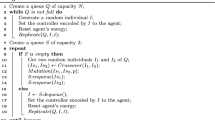Abstract
This paper is concerned with a fixed-size population of autonomous agents facing unknown, possibly changing, environments. The motivation is to design an embodied evolutionary algorithm that can cope with the implicit fitness function hidden in the environment so as to provide adaptation in the long run at the level of the population. The proposed algorithm, termed mEDEA, is shown to be both efficient in unknown environment and robust with regards to abrupt, unpredicted, and possibly lethal changes in the environment.
Access this chapter
Tax calculation will be finalised at checkout
Purchases are for personal use only
Preview
Unable to display preview. Download preview PDF.
Similar content being viewed by others
References
Bedau, M.A., McCaskill, J.S., Packard, N.H., Rasmussen, S., Adami, C., Green, D.G., Ikegami, T., Kaneko, K., Ray, T.S.: Open problems in artificial life. Artificial Life 6, 363–376 (2000)
Beyer, H.-G., Schwefel, H.-P.: Evolution strategies – A comprehensive introduction. Natural Computing 1, 3–52 (2002)
Dawkins, R.: The Selfish Gene. Oxford University Press, Oxford (1976)
Baele, G., et al.: Open-ended on-board evolutionary robotics for robot swarms. In: Proceedings of the IEEE Conference on Evolutionary Computation, CEC 2009 (2009)
Ficici, S., Watson, R., Pollack, J.: Embodied evolution: A response to challenges in evolutionary robotics. In: Wyatt, J.L., Demiris, J. (eds.) Proceedings of the Eighth European Workshop on Learning Robots, pp. 14–22 (1999)
Fletcher, J.A., Bedau, M.A., Zwickp, M.: Effect of environmental structure on evolutionary adaptation. In: Artificial Life VI, pp. 189–198. MIT Press, Cambridge (1998)
Lehman, J., Stanley, K.O.: Exploiting open-endedness to solve problems through the search fo novelty. In: Proceedings of the Eleventh International Conference on Artificial Life (ALIFE XI), MIT Press, Cambridge (2008)
Rosin, C., Belew, R.: New methods for competitive coevolution. Evolutionary Computation (1996)
Wolpert, D.H., Tumer, K.: Optimal payoff functions for members of collectives. Advances in Complex Systems 4(2/3), 265–279 (2001)
Author information
Authors and Affiliations
Editor information
Editors and Affiliations
Rights and permissions
Copyright information
© 2010 Springer-Verlag Berlin Heidelberg
About this paper
Cite this paper
Bredeche, N., Montanier, JM. (2010). Environment-Driven Embodied Evolution in a Population of Autonomous Agents. In: Schaefer, R., Cotta, C., Kołodziej, J., Rudolph, G. (eds) Parallel Problem Solving from Nature, PPSN XI. PPSN 2010. Lecture Notes in Computer Science, vol 6239. Springer, Berlin, Heidelberg. https://doi.org/10.1007/978-3-642-15871-1_30
Download citation
DOI: https://doi.org/10.1007/978-3-642-15871-1_30
Publisher Name: Springer, Berlin, Heidelberg
Print ISBN: 978-3-642-15870-4
Online ISBN: 978-3-642-15871-1
eBook Packages: Computer ScienceComputer Science (R0)




